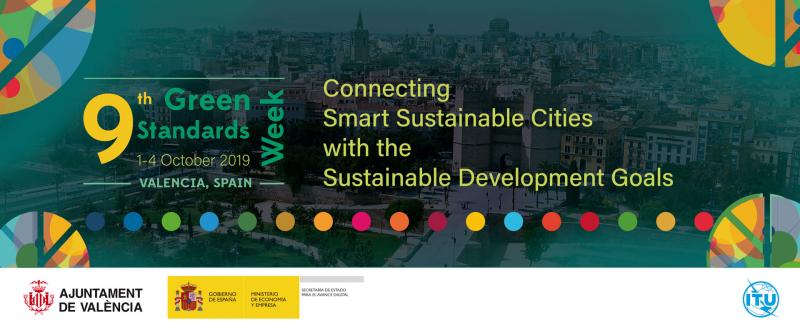
ITU Green Standards Week adopts Call to Action to move to Smart Sustainable Cities
Innovation in the interests of urban sustainability is in focus this week at the ninth edition of ITU Green Standards Week in Valencia, Spain, 1-4 October 2019.
ITU Green Standards Week has brought together governments, city leaders, businesses and citizens to share their experiences in driving the behavioural change required to achieve smart city objectives. These participants have adopted a ‘Call to Action’ urging city stakeholders to accelerate the transition to Smart Sustainable Cities
The Call to Action highlights that our cities – as powerful hubs of innovation, and a central force behind humanity’s impact on our environment – must make a defining contribution to the achievement of the United Nations Sustainable Development Goals (SDGs). The Call to Action adds that this contribution will receive essential support from information and communication technologies (ICTs) and supporting international standards.
1. Connect Smart Sustainable Cities with the SDGs
The SDGs offer cities a clear framework to adopt a citizen-centric approach to smart city innovation. This innovation is supported by ‘Key Performance Indicators for Smart Sustainable Cities’ based on ITU standards, as well as the work of the United for Smart Sustainable Cities Initiative.
2. Cities should lead the way in the application of frontier technologies to protect the environment and fight climate change:
Cities should play a leading role the application of frontier technologies in fields such as Artificial Intelligence, IMT-2020 (5G) and the Internet of Things. ‘Digital twins’ – virtual replicas of urban environments – also show considerable potential to support environmental sustainability.
3. Use international standards as guidance for the development of Smart Sustainable Cities:
International standards support the interconnection and interoperability of city systems and the efficient use of smart city data. Standards guide the coordinated application of ICTs in smart cities and the evaluation of such applications’ contribution to the achievement of smart city objectives.
4. Adopt Circular Economy principles to reduce e-waste:
Policies encouraging a lifecycle view of ICT production, use and disposal will be essential to the achievement of resource-efficient ‘circular economies’. Actions in this regard could receive valuable support from international standards for the sound management of e-waste.
5. Implement a smart city platform to integrate smart technologies:
Smart city platforms coordinate the collection and analysis of city data, delivering insights that inform improvements to the efficiency and sustainability of city operations. International standards support the interoperability of smart city platforms, a key requirement in maximizing the collective benefits of smart city data.
6. Take a proactive stance towards the environmental performance of frontier technologies:
The application of frontier technologies should consider all possible impacts of these technologies, including environmental externalities. Investigation into these externalities will form a key part of the work of a new ITU Focus Group established to study environmental efficiency in the age of Artificial Intelligence, increasing automation, and smart manufacturing.
7. Involve citizens, researchers and other relevant stakeholders in developing standards and technologies to meet the needs of end-users:
Adherence to the principle of ‘privacy by design’ and greater use of crowdsourcing and other means of co-creation could make a key contribution to the alignment of citizens’ needs with the development and application of ICTs and supporting international standards.
8. Adopt digital rights principles that ensure the inclusion of all people in the development of Smart Sustainable Cities:
All citizens should benefit from affordable and accessible ICT services and avenues to gain to related digital skills. Inclusivity should be incorporated by design into the digital platforms supporting Smart Sustainable Cities.
9. Accelerate the transformation of cities with a circular approach:
The transition to Smart Sustainable Cities will be a process of continuous change. Cities should adopt a circular approach to the application of enabling technologies, one that continually assesses city needs, applies appropriate technologies, and evaluates the impacts of technology applications.
10. The 2030 Agenda can only be met if we work together by boosting partnerships to mobilize expertise:
The SDGs highlight the importance of partnerships. The transition to Smart Sustainable Cities will require enhanced cooperation at the international, regional, national and local levels, among governments, businesses, academia and civil society organizations.
